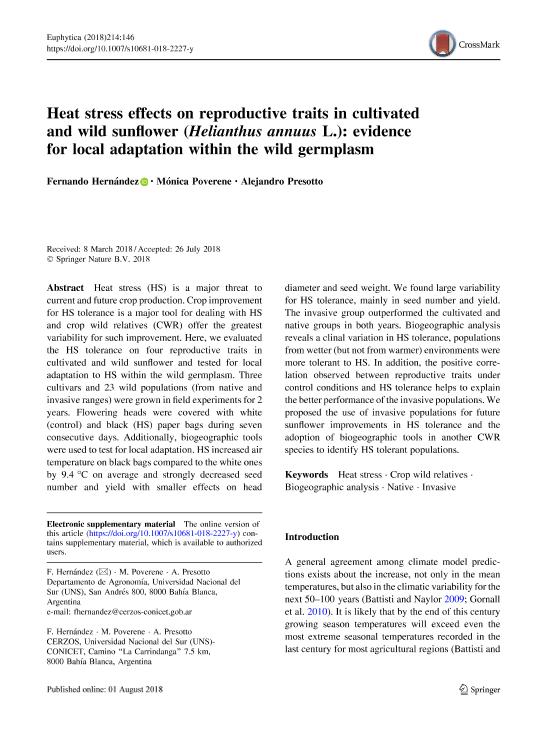Artículo
Heat stress effects on reproductive traits in cultivated and wild sunflower (Helianthus annuus L.): evidence for local adaptation within the wild germplasm
Fecha de publicación:
01/08/2018
Editorial:
Springer
Revista:
Euphytica
ISSN:
0014-2336
e-ISSN:
1573-5060
Idioma:
Inglés
Tipo de recurso:
Artículo publicado
Clasificación temática:
Resumen
Heat stress (HS) is a major threat to current and future crop production. Crop improvement for HS tolerance is a major tool for dealing with HS and crop wild relatives (CWR) offer the greatest variability for such improvement. Here, we evaluated the HS tolerance on four reproductive traits in cultivated and wild sunflower and tested for local adaptation to HS within the wild germplasm. Three cultivars and 23 wild populations (from native and invasive ranges) were grown in field experiments for 2 years. Flowering heads were covered with white (control) and black (HS) paper bags during seven consecutive days. Additionally, biogeographic tools were used to test for local adaptation. HS increased air temperature on black bags compared to the white ones by 9.4 °C on average and strongly decreased seed number and yield with smaller effects on head diameter and seed weight. We found large variability for HS tolerance, mainly in seed number and yield. The invasive group outperformed the cultivated and native groups in both years. Biogeographic analysis reveals a clinal variation in HS tolerance, populations from wetter (but not from warmer) environments were more tolerant to HS. In addition, the positive correlation observed between reproductive traits under control conditions and HS tolerance helps to explain the better performance of the invasive populations. We proposed the use of invasive populations for future sunflower improvements in HS tolerance and the adoption of biogeographic tools in another CWR species to identify HS tolerant populations.
Palabras clave:
BIOGEOGRAPHIC ANALYSIS
,
CROP WILD RELATIVES
,
HEAT STRESS
,
INVASIVE
,
NATIVE
Archivos asociados
Licencia
Identificadores
Colecciones
Articulos(CERZOS)
Articulos de CENTRO REC.NAT.RENOVABLES DE ZONA SEMIARIDA(I)
Articulos de CENTRO REC.NAT.RENOVABLES DE ZONA SEMIARIDA(I)
Citación
Hernández, Fernando; Poverene, María Mónica; Presotto, Alejandro Daniel; Heat stress effects on reproductive traits in cultivated and wild sunflower (Helianthus annuus L.): evidence for local adaptation within the wild germplasm; Springer; Euphytica; 214; 8; 01-8-2018; 146
Compartir
Altmétricas




